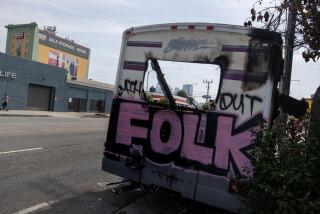Long Beach bicyclists register their displeasure
Anna Seng had no idea it was against the law to ride an unregistered bike in Long Beach, a place that has pledged to be “the most bicycle-friendly city in America.”
But she found out earlier this year when her teenage son borrowed a cousin’s bike and came home with a big surprise: a ticket for not having a bell — or registration.
“I didn’t even know that existed until I got the ticket,” Seng said. “People that I talk to — none of them tell me they have registration.”
Now she and her son are preparing for a court date to challenge the fines, which total more than $400.
“Thirty or forty bucks would make sense,” she said, “but $400? I was shocked.”
For many in the fast-growing Long Beach cycling community, the little-known municipal law requiring that all bikes be registered at a local fire station seems out of sync with the city’s push to become a haven for cyclists.
In the last two years, Long Beach has undergone a flurry of bike-oriented transportation projects. After building dozens of miles of new bike lanes, the city last month opened its first “bike boulevard,” a side street designed to offer safe passage for cyclists. Workers also have begun installing bike-only traffic signals along two streets through the city’s downtown — the first step in handing over an entire lane to bikes to eliminate accidents with cars.
Now, in a significant olive branch to cyclists, the City Council is considering eliminating the mandatory bike registration, a detail Long Beach seemed to have overlooked when rolling out its ambitious bike agenda.
Bike registration programs, which typically consist of a numbered sticker applied to bicycles and logged with the city, are meant to give law enforcement officials a way to track down stolen bikes.
In recent years, however, cities nationwide, including Los Angeles, have done away with registration or made it optional. Licensing has gone out of favor in part because several national online registries accomplish the same objective; and, as many cyclists point out, so few cyclists participate in the city-run programs that it’s hard to see how they are effective.
When the law has been enforced in Long Beach, cycling advocates say, it has resulted in steep fines.
The city came under criticism in October after police stopped about 85 cyclists during a Critical Mass ride near Cal State Long Beach. Officers handed out about 60 citations for lacking night lighting, running stop signs or riding unregistered bicycles, and they confiscated about 20 bikes. Critical Mass rides, aimed at drawing attention to the difficulties bikers face in urban areas, are held worldwide.
The police perspective on the Oct. 29 event was that officers had to enforce traffic safety laws, but cyclists saw it as harassment in contradiction with a city eager to promote two-wheeled transportation.
“It was not a bicycle-friendly take on things,” said Mark Bixby, a cyclist who has worked with the city over the last few years to organize a bike race and festival. The police crackdown may have “left a bad taste in my mouth,” he said, but it amounted to a minor setback in a burgeoning biking movement.
“The big picture is that it takes most cities a decade or longer to become bike-friendly, and Long Beach is sort of on a fast track,” Bixby said. “We’ve made 10 or 15 steps forward, and this is really just a step and a half back.”
Since the October incident, cycling advocates have showed up at City Hall to demand better treatment from motorists and police and have met with Police Chief Jim McDonnell. They asked leaders for a repeal of mandatory registration, a bicycle advocacy commission and passage of a cyclists’ bill of rights.
Last month, three council members proposed making bike registration voluntary, noting in a report that cyclists are in “almost unanimous” opposition to the requirement and most do not register their bikes. The program costs the city more money than it takes in, according to the report.
“We’ve had incidents where people have gotten tickets — pretty pricey tickets — for having their bicycles unregistered without even knowing they had to have one,” said Councilman Robert Garcia, who supports the proposal.
Garcia said the discord over bike registration is an example of the growing pains that are bound to happen as the city moves quickly to become more accessible, safe and convenient for bikes. And although there will be conflicts as cyclists become a more visible part of the urban landscape, he said, he hopes laws that get in the way of cyclists feeling welcome can be changed.
“If we’re going to be this great bike-friendly city,” he said, “we need to have progressive bike-friendly policies.”
More to Read
Sign up for Essential California
The most important California stories and recommendations in your inbox every morning.
You may occasionally receive promotional content from the Los Angeles Times.











